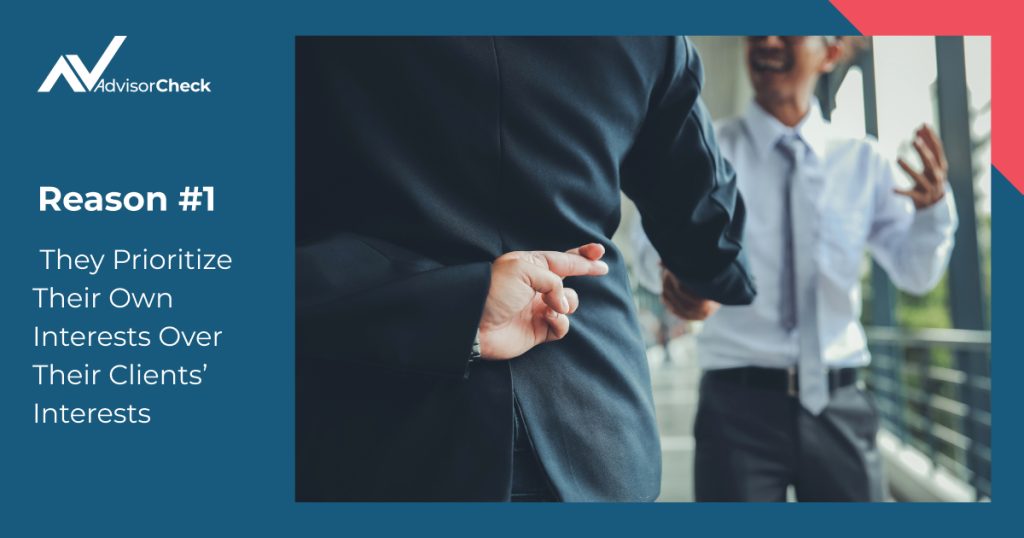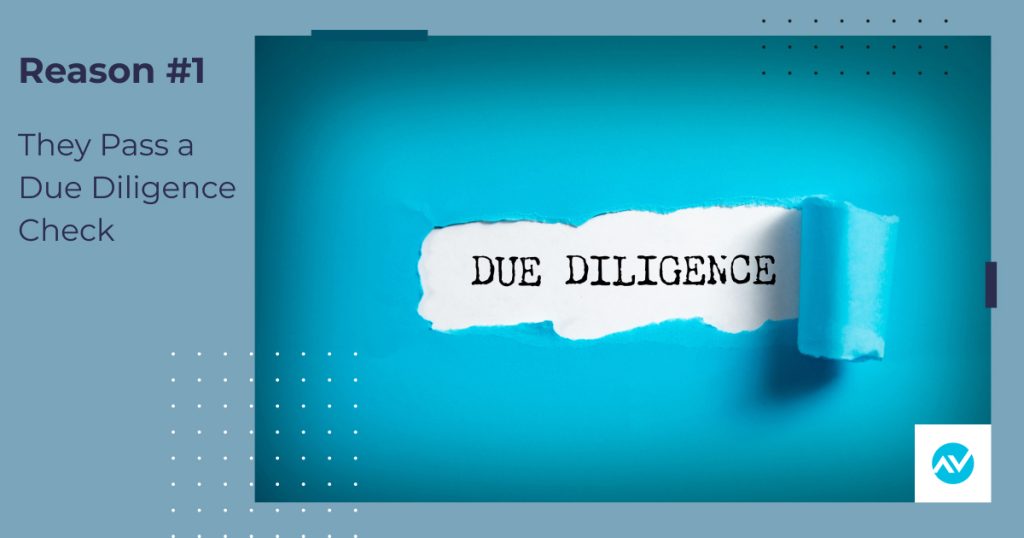
Financial Advisor
5 Reasons You Should Not Hire a Financial Advisor (and the 3 Reasons Why You Should)
We are in the spotlight












Perhaps some recent life changes have prompted you to search for a new financial advisor, or maybe you’ve simply decided that you could use professional financial advice. Either way, there are some attributes that might seem obvious to seek out in this professional that has a high probability of maximizing your finances. For instance, you probably already know how important it is that your financial advisor be a fiduciary, a designation that guarantees they are legally required to act in the best interests of their clients. In addition, your financial advisor should have legitimate credentials, including titles like CFP, CFA, ChFC, PFS and AIF. More than likely, you’re probably already looking for a financial advisor with a strong, dependable reputation, perhaps asking for referrals from people you trust. In this vein, another aspect to consider is the reputation of the business where a prospective advisor works – a locally-based company with a history of good performance is more trustworthy. Today, we’ll cover all the most important red flags to look out for when choosing a new financial advisor, as well as the “green flags” – the positive attributes that your ideal advisor will have. We’ll go into depth, describing why these features are problematic or beneficial and explaining how to find the best possible professional for your needs. Another note of advice: before you decide to leave your money in anyone’s care, make sure you meet with at least three prospective advisors. After all, broadening your options is never a bad idea. Here are our top five red flags when deciding whether to hire a new financial advisor: We’re listing this reason first because it’s probably the most important criterion for a prospective financial advisor. If an advisor puts their own interests before that of their clients, run in the other direction. You might encounter this issue when working with financial advisors who receive their compensation either by commission or by selling financial products. For instance, they might suggest financial products that would increase their earnings, but that aren’t the optimal choice for your situation, thereby leading you astray into poor financial decisions. For this reason, before you hire anyone, make sure you’re clear on exactly how they’ll be compensated to nip any potential conflicts of interest in the bud. Another way that advisors can prioritize their interests above those of their clients is by charging exorbitant fees that are not warranted for the services they’re providing. As a general guideline, U.S. News recommends that “you should be paying no more than 0.25% to an advisor for your asset allocation and investment selection.” Avoid advisors who charge significantly more than this without being able to explain why the services they provide justify those rates. "Throughout my career working in finance, I have met with a lot of advisors and heard so many stories from investors who have had horrible experiences. In the past, especially when I first started my career, there have many been instances where investors have worked with someone who put their own needs above that of their clients, says KJ Kim of AdvisorCheck. "The introduction of fiduciaries has significantly improved the landscape of financial advisors to counteract this and curtail these issues from occurring, but every once in a while, these issues still do arise. Make sure that the advisor you work with is upholding their fiduciary duties, because your financial future depends on it," KJ continued. If a prospective advisor dismisses the importance of having your account with a third-party custodian, this is a huge red flag and puts you at risk of fraud like that committed by the now notorious Bernie Madoff. A third-party custodian is defined by MarketsWiki as “an intermediary between the investment adviser (or fund manager) and the client . . . [such that] the fund manager or adviser never handles client checks, deposits or withdrawals directly.” Examples of third-party custodians include banks, brokerage firms, Fidelity Investments or Charles Schwab Corporation. Avoid any advisors who don’t want to work with a third-party custodian. An additional red flag: when an advisor says that they have exclusive access to any investments. According to Larry Miles, president and CEO of an audit, tax and consulting service called Choreo, “If your advisor promises to get you into investments that only he or she (or their firm) can access, that's [a] lie.” You should not work with any advisor who lies to you, and claiming this kind of exclusivity is a particularly unethical lie. Having side businesses is acceptable, but if an advisor is double dipping on fees in order to maximize their commissions, this could be a problem. If this is a concern, we recommend that you look into the sources of a prospective advisor’s compensation – request a copy of Form ADV, which is required of any financial advisor as part of registering their license, and look for their fee schedule as well as whether they receive commissions. Larry Miles specifically states that if an advisor is an insurance broker or a broker-dealer, this is “a yellow flag that you want to look into because it creates a conflict of interest.” Do your research and make sure all this info is ironed out before you decide to hire someone. Whether or not you have in-depth knowledge of finance, you should expect your advisor to treat you with respect and explain themselves clearly and thoroughly. After all, you’re hiring them to provide a service that includes not only making financial recommendations, but also explaining their reasons for those recommendations. If you feel dismissed or as if you were spoken to in a condescending tone when you do meet with a prospective financial advisor – especially in response to any questions you might have – it’s almost certain that you’re not going to be receiving the best possible advice, so you should move on. Another related problem can arise if you’re married and a prospective advisor ignores your significant other, operating on the assumption that you’re in charge of all financial decisions. Although this problem can arise with all genders, it’s most often reported when couples work with male advisors, who might ignore the wife when a couple comes to them for advice. Naturally, this will make your spouse feel highly disrespected and limit their ability to offer crucial input about your shared financial decisions. To avoid this outcome, you might want to invite your spouse to meetings with prospective advisors, just to ensure they treat you both with equal consideration. Your advisor should not have a cookie cutter plan or financial product that they dole out to all their clients without adapting it to their individual situations. Often, if they do, it can indicate that they make money by selling products/plans and they’re trying to hit a monthly quota. U.S. News perfectly sums up the problem: “When an advisor's answer to your questions always seems to circle back to ‘buy this,’ it's a good sign that the advisor is trying to make your needs fit a product rather than finding products to fit your customized plan.” Your advisor should also come up with a plan that takes all your financial priorities into account, not just those related to investment. For example, their plan should accommodate your goals surrounding things like taxes and estate planning. It is their job to prioritize your financial interests, which includes adapting their recommendations to your particular situation. Ask any prospective advisor to go into detail about how they customize their advice for clients’ individual needs in order to rule out advisors who don’t do that. If a prospective advisor meets these three crucial criteria, then you’re off to a great start: A baseline requirement of whichever advisor you end up hiring is that they pass a due diligence check. You can search for prospective advisors’ records on AdvisorCheck, an online background check/verification service that allows investors to instantly discover whether someone they’re considering hiring has any disclosures on their record. The platform “consolidates hard to obtain information into a detailed report encompassing your current or prospective advisor’s registrations, legal records, and personal conduct,” making it easy to figure out . If you run an AdvisorCheck search on an advisor you had hoped to work with and the report comes back with something concerning, it’s a good idea to ask them about it, at the very least. Knowledge is power, and AdvisorCheck empowers you with the knowledge needed to choose a trustworthy professional to manage your money. As we’ve already emphasized, good financial advisors put their own interests second to the interests of their clients. According to Investopedia, “The advisor must believe that the financial interests of both parties should be aligned, or else a harmful relationship may occur.” An advisor who sells their clients products that they don’t need is not acting in their best interests. Examples of such products include costly insurance policies with excessive coverage, as well as mutual funds with high sales loads (because they could instead be recommending higher-quality mutual funds). Another way that good financial advisors prioritize their clients’ interests is by disagreeing with them when needed. If your advisor always agrees with you, even when you’re wrong, they will inevitably lead you astray. When you meet with a prospective advisor, it’s a definite green flag if they’re able to disagree with you in a direct and respectful manner, and then explain why they’re doing so – it means they’re more likely to give you honest advice if you end up working together. The financial advisor you choose to hire should be someone who views their clients’ finances holistically, meaning in the context of their lives as a whole. Yes, they should account for basic details like your income level or the kinds of investments you’re interested in. But they should also learn the following about their clients, according to Blue Shore Financial: Understanding clients’ life goals in particular is integral to developing a long-term financial plan. As Boulay Group puts it, “Measuring success through the achievement of long-term goals and milestones is a better indicator of financial accomplishment than other investment benchmarks.” Make sure your chosen advisor is focused on planning well into the future. Relatedly, short-sighted advisors tend to make erratic decisions at the drop of a hat. If there’s a slight dip in the market, you don’t want an advisor who panics and responds with a drastic recommendation; you want someone who assesses where their current plan might need some tweaks, but still focuses on the long game when it comes to your financial well-being. You might ask prospective advisors how they’d respond to a particular scenario to get a sense of whether they’re prone to panicking. After you hire a financial advisor, here are some signs things are going well and that you should probably stick around: If you hire a financial advisor but things start to go off track, here are a few signs you should swap: If these issues are a dealbreaker and you end up having to fire your financial advisor, here’s some helpful advice on how to do so. When you’ve found an advisor who appears to consistently act in their clients’ best interests and makes holistic, long-term financial plans, run a due diligence check to empower yourself with as much knowledge as possible by searching for them on AdvisorCheck. Written by: Billly Quirk Fact checked by: Luke Jara Reviewed by: Leonard Kim Disclosure The information provided in this article was written by the research and analysis team at AdvisorCheck.com to help all consumers in their financial journeys, by providing the resources and the insights to help improve one’s financial health, make it through recessionary and inflationary periods of time, and save their earnings to use them towards building a secure financial future. Unauthorized reproduction or use of this material is strictly prohibited without prior approval. Any parties interested in content syndication, references, interviews, or PR, please contact our marketing team at marketing@aimranalytics.com AdvisorCheck.com is an independent data and analytics company founded on the principles of helping to provide transparency, simplicity, and conflict-free information to all consumers. As an independent company providing conflict-free information, Advisorcheck.com does not participate, engage with, or receive funding from any affiliate marketing programs or services. To become a free AdvisorCheck member, visit advisorcheck.com/signup. These are the five worst things you can encounter when you are looking into a financial advisor. But there’s hope if they meet these three criteria.
5 Reasons Not to Choose a Financial Advisor
Reason #1: They Prioritize Their Own Interests Over Their Clients’ Interests

Reason #2: They Dismiss the Need for a Third-Party Custodian or Claim Exclusivity

Reason #3: They Double Dip on Fees To Maximize Their Commissions

Reason #4: They Are Condescending and Dismissive Toward You (or Your Spouse)

Reason #5: They Don’t Customize Their Financial Plan for Your Situation

3 Reasons to Choose a Financial Advisor
Reason #1: They Pass a Due Diligence Check

Reason #2: They Act in the Interests of Their Clients

Reason #3: They Make Holistic, Long-Term Financial Plans Without Panicking

What to Look for Once You’ve Hired an Advisor
Rely On AdvisorCheck As a Litmus Test
Most read
The content of video and blog articles are for informational and entertainment purposes only and do not constitute investment, tax, legal, or financial advice. Always consult with a qualified professional before making any financial decisions. The views expressed are those of the author and do not reflect the opinions or recommendations of any affiliated entities.